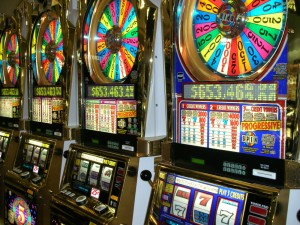Pokies scourge threatens migrants and refugees
 Refugees and migrants with poor language skills are at risk of becoming problem poker machine gamblers, according to gambling counsellors and experts on the social effects of gaming.
Refugees and migrants with poor language skills are at risk of becoming problem poker machine gamblers, according to gambling counsellors and experts on the social effects of gaming.
The poorest suburbs are the areas where the lion’s share of money is lost on poker machines, gaming statistics show.
And it is these same suburbs where many refugees or new migrants settle because they offer affordable rental housing.
In Melbourne, among the highest pokies losses recorded were those in the local government areas of Brimbank and Dandenong, with more than $48.1 million and $38.8 million lost respectively for the 2012-13 financial year. Both areas have large numbers of refugees, asylum seekers or new migrants.
The Whittlesea and Wyndham areas are also home to significant numbers of refugees and migrants and also have relatively high pokies loss rates with $32.7 million and $32.1 million respectively.
Victorians poured $2.5 billion into the state’s 26,000 poker machines last financial year – or about $284,000 every hour.
A recent Victorian Competition and Efficiency Commission report said there were 30,000 problem gamblers in Victoria. Economic and social costs of the issue were estimated in the report at around $2.8 billion with the State Government set to reap just $1.25 billion in taxes from pubs and clubs.
Staff at settlement agency AMES have, anecdotally, reported several instances of clients falling into debt after gambling on poker machines.
In one case, a refugee client from Afghanistan won $12,000 in a single session at a pokies venue. The man is now $4,000 in debt to friends because of subsequent losses.
Research by Dr Charles Livingstone of Monash University’s School of Public Health and Preventative Medicine said poker machines were disproportionately located in disadvantaged areas.
“If you have poker machines in areas of disadvantage, people will use them. The industry is aware that disadvantaged areas are more lucrative and they have located machines in these areas since they were first introduced in the 1990s,” Dr Livingstone said.
Anti-poker machines campaigner Paul Bendat says it’s easy to see why asylum seekers, who may be socially dislocated and who may have little to occupy themselves with, would be attracted to pokies venues.
“For someone from a culture where there is little or no gaming, it might be intriguing to visit a pokies venue,” he said.
“Provided you had a little money to spend, you could see how easy it would be to fall into the trap of trying to win some more,” Mr Bendat said.
Mission Australia gambling counsellor Jeremy Pragnell says people with poor English skills and those out of work were particularly at risk.
“The main reason problems develop is ease of access – gambling is everywhere,” he said.
“The reason so many venues do well in low socio-economic areas is because people are clinging to the hope that things could get better for them.
He said discounted or free bar food lured people into venues.












